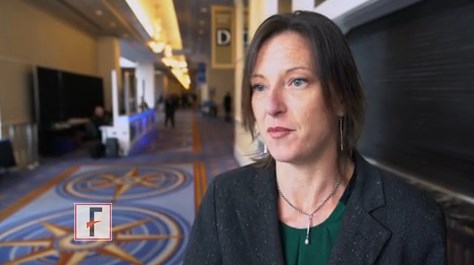User login
NATIONAL HARBOR, MD. – Next-generation sequencing of high-grade serous ovarian tumor specimens taken during interval debulking identified several mutations that matched those in cell-free DNA (cfDNA), Rebecca C. Arend, MD, said at the annual meeting of the Society of Gynecologic Oncology.
Furthermore, three of four patients whose ovarian cancer recurred had mutations in cfDNA that were previously detected in tumors, said Dr. Arend of the University of Alabama at Birmingham.
Researchers continue to search for ways to spare patients with ovarian cancer from serial biopsies, Dr. Arend noted during a video interview. As part of that work, she and her associates performed longitudinal next-generation sequencing of 50 genes in tumor and plasma specimens from 14 patients with high-grade serous ovarian cancer.
Mutations found only in tumors were relatively consistent before and after neoadjuvant chemotherapy, while mutations found only in cell-free DNA varied substantially.
The researchers also sequenced plasma samples from four patients at cancer recurrence. Three patients had at least one mutation that was previously detected in their tumor sample. Implicated genes included PIK3CA, TP53, KIT, and KDR.
Many studies have sought circulating tumor markers that reliably predict tumor recurrence. When it comes to cfDNA, “we are not there yet,” but the work is worthwhile, Dr. Arend stressed. Sequencing tumor and cfDNA specimens from patients at multiple points during their journey might one day help pinpoint mutations that reliably predict cancer recurrence, sparing patients from repeated biopsies and helping them efficiently enter clinical trials that target their specific mutation, she added.
Dr. Arend cited no funding sources and reported having no conflicts of interest.
The video associated with this article is no longer available on this site. Please view all of our videos on the MDedge YouTube channel
NATIONAL HARBOR, MD. – Next-generation sequencing of high-grade serous ovarian tumor specimens taken during interval debulking identified several mutations that matched those in cell-free DNA (cfDNA), Rebecca C. Arend, MD, said at the annual meeting of the Society of Gynecologic Oncology.
Furthermore, three of four patients whose ovarian cancer recurred had mutations in cfDNA that were previously detected in tumors, said Dr. Arend of the University of Alabama at Birmingham.
Researchers continue to search for ways to spare patients with ovarian cancer from serial biopsies, Dr. Arend noted during a video interview. As part of that work, she and her associates performed longitudinal next-generation sequencing of 50 genes in tumor and plasma specimens from 14 patients with high-grade serous ovarian cancer.
Mutations found only in tumors were relatively consistent before and after neoadjuvant chemotherapy, while mutations found only in cell-free DNA varied substantially.
The researchers also sequenced plasma samples from four patients at cancer recurrence. Three patients had at least one mutation that was previously detected in their tumor sample. Implicated genes included PIK3CA, TP53, KIT, and KDR.
Many studies have sought circulating tumor markers that reliably predict tumor recurrence. When it comes to cfDNA, “we are not there yet,” but the work is worthwhile, Dr. Arend stressed. Sequencing tumor and cfDNA specimens from patients at multiple points during their journey might one day help pinpoint mutations that reliably predict cancer recurrence, sparing patients from repeated biopsies and helping them efficiently enter clinical trials that target their specific mutation, she added.
Dr. Arend cited no funding sources and reported having no conflicts of interest.
The video associated with this article is no longer available on this site. Please view all of our videos on the MDedge YouTube channel
NATIONAL HARBOR, MD. – Next-generation sequencing of high-grade serous ovarian tumor specimens taken during interval debulking identified several mutations that matched those in cell-free DNA (cfDNA), Rebecca C. Arend, MD, said at the annual meeting of the Society of Gynecologic Oncology.
Furthermore, three of four patients whose ovarian cancer recurred had mutations in cfDNA that were previously detected in tumors, said Dr. Arend of the University of Alabama at Birmingham.
Researchers continue to search for ways to spare patients with ovarian cancer from serial biopsies, Dr. Arend noted during a video interview. As part of that work, she and her associates performed longitudinal next-generation sequencing of 50 genes in tumor and plasma specimens from 14 patients with high-grade serous ovarian cancer.
Mutations found only in tumors were relatively consistent before and after neoadjuvant chemotherapy, while mutations found only in cell-free DNA varied substantially.
The researchers also sequenced plasma samples from four patients at cancer recurrence. Three patients had at least one mutation that was previously detected in their tumor sample. Implicated genes included PIK3CA, TP53, KIT, and KDR.
Many studies have sought circulating tumor markers that reliably predict tumor recurrence. When it comes to cfDNA, “we are not there yet,” but the work is worthwhile, Dr. Arend stressed. Sequencing tumor and cfDNA specimens from patients at multiple points during their journey might one day help pinpoint mutations that reliably predict cancer recurrence, sparing patients from repeated biopsies and helping them efficiently enter clinical trials that target their specific mutation, she added.
Dr. Arend cited no funding sources and reported having no conflicts of interest.
The video associated with this article is no longer available on this site. Please view all of our videos on the MDedge YouTube channel
AT THE ANNUAL MEETING ON WOMEN’S CANCER
Key clinical point: Next-generation sequencing of cell-free DNA specimens (liquid biopsies) might one day help identify tumor recurrence in patients with high-grade serous ovarian cancer.
Major finding: Three of four patients whose cancer recurred had mutations in cell-free DNA that were previously detected in tumor specimens collected during interval debulking.
Data source: Next-generation sequencing of tumor and cell-free (plasma) DNA from 14 patients with high-grade serous ovarian cancer before and after platinum-based neoadjuvant chemotherapy.
Disclosures: Dr. Arend cited no funding sources and reported having no conflicts of interest.
